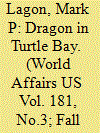|
|
|
Sort Order |
|
|
|
Items / Page
|
|
|
|
|
|
|
| Srl | Item |
| 1 |
ID:
163919


|
|
|
|
|
| Summary/Abstract |
China’s role in the United Nations (UN) is steadily rising at a time the United States is seeking burden-sharing and rethinking its multilateral leadership role. This article highlights that China’s increasing role in three critical areas—(1) UN peacekeeping; (2) the work of the UN on human rights, particularly in the Human Rights Council; and (3) the governance of the digital realm and Internet freedom—has significant implications for U.S. interests and broader global governance efforts. Although China’s transformation into a responsible stakeholder in various areas of the UN’s work could be promising, Beijing’s attempts to alter existing liberal norms bear close examination. Those seeking a larger Chinese role in the UN might best be careful what they wish for. Despite the emergence of populism and some skepticism of multilateral arrangements in their domestic politics, the United States and like-minded nations have an interest in reinforcing liberal norms in these three areas of global governance and beyond.
|
|
|
|
|
|
|
|
|
|
|
|
|
|
|
|
| 2 |
ID:
107566


|
|
|
|
|
| Publication |
2011.
|
| Summary/Abstract |
How should we understand the cultural politics that has surrounded the development of international human rights? Two perspectives frame contemporary debate. For 'cultural particularists', human rights are western artefacts; alien to other societies, and an inappropriate basis for international institutional development. For 'negotiated universalists', a widespread global consensus undergirds international human rights norms, with few states openly contesting their status as fundamental standards of political legitimacy. This article advances an alternative understanding, pursuing John Vincent's provocative, yet undeveloped, suggestion that while the notion of human rights has its origins in European culture, its spread internationally is best understood as the product of a 'universal social process'. The international politics of individual/human rights is located within an evolving global ecumene, a field of dynamic cultural engagement, characterized over time by the development of multiple modernities. Within this field, individual/human rights have been at the heart of diverse forms of historically transformative contentious politics, not the least being the struggles for imperial reform and change waged by subject peoples of diverse cultural backgrounds; struggles that not only played a key role in the construction of the contemporary global system of sovereign states, but also transformed the idea of 'human' rights itself. In developing this alternative understanding, the article advances a different understanding of the relation between power and human rights, one in which rights are seen as neither simple expressions of, or vehicles for, western domination, nor robbed of all power-political content by simple notions of negotiation or consensus. The article concludes by considering, in a very preliminary fashion, the implications of this new account for normative theorizing about human rights. If a prima facie case exists for the normative justifiability of such rights, it lies first in their radical nature-in their role in historically transformative contentious politics-and second in their universalizability, in the fact that one cannot plausibly claim them for oneself while denying them to others.
|
|
|
|
|
|
|
|
|
|
|
|
|
|
|
|
|
|
|
|
|